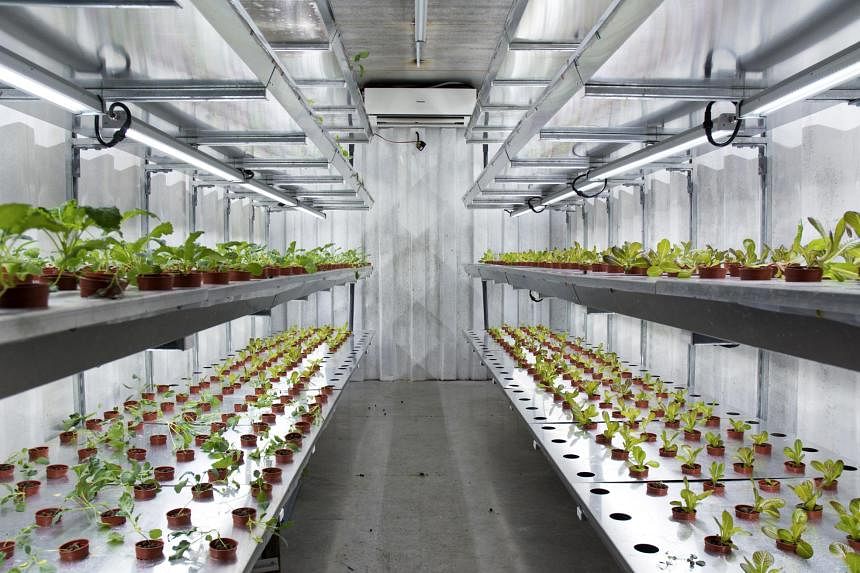SINGAPORE – What would have been one of the Republic’s largest indoor vegetable farms, boosting local production of greens by 10 per cent, is no more as the company behind it has returned the plot of land to the Government.
Local vertical farm VertiVegies had intended to produce some six tonnes of vegetables daily on a 2ha plot, including local favourites such as xiao bai cai, nai bai and cabbage.
But it was unable to finish constructing its farm in Lim Chu Kang within the three-year timeframe stipulated under the tender conditions.
The company said it ran into issues with its joint venture partner, Chinese farming company SananBio, which supplies the farm with its production hardware.
As a result, it had to return the plot of land to the Singapore Food Agency (SFA) in April 2022, The Straits Times has learnt.
This development is yet another blow to the Republic’s goal of producing 30 per cent of its nutritional needs locally by 2030.
In 2022, the total supply of vegetables in Singapore stood at 537,800 tonnes. Local vegetable production accounted for around 4 per cent of total food consumption that year.
An article by the MIT Technology Review in 2020 said that if the planned VertiVegies farm could meet its production targets, it would be able to boost the country’s vegetable production by around 10 per cent.
In its financial statement for FY2023, the company said it had been unable to find viable alternatives to enhancing production since it returned the plot of land to the authorities, which could potentially affect its future revenue forecasts.
In the meantime, it is pivoting its business strategy and exploring a number of options to contribute to Singapore’s 30 by 30 goal. The company declined to comment further on this strategy.
Aside from its vertical farm in Lim Chu Kang, VertiVegies also has a research and innovation centre, which is located at Science Park, according to the FY2023 statement.
VertiVegies is part of another company known as Agrimax Ventures, which looks into improving agricultural productivity through various ways such as seed genetics development, according to its website.
It also works with local schools and educational institutes to raise awareness and support the growth of the local food production sector.
VertiVegies also said in the financial statement that it had not received the “requisite intellectual property support” from SananBio. According to the MIT article, the partnership would have allowed VertiVegies to access SananBio’s data repository to help its veggies grow faster and better.
“This has caused financial losses to the company, as a significant amount was invested into the property, construction designs, and tender,” according to the statement.
Earlier, the company noted in its FY2022 financial statement that it faced an “open-ended suspension of supply of raw materials” from SananBio, causing VertiVegies to have to suspend or cancel ongoing business contracts with prospective customers in Singapore, India and the United Arab Emirates.
Checks by ST found that the company was awarded the 2ha plot of land in Lim Chu Kang for $279,000 in 2018, for a tenure period of 20 years.
According to SFA’s tender conditions for the sale of agricultural land for farm use, companies have to finish constructing their farms within three years of the date of the tender award and obtain a temporary occupation permit. Thereafter, they will be able to apply for a farm licence from SFA and begin operations.
According to SFA, the three-year timeline takes into consideration factors such as inclement weather, the tight labour market, infectious diseases, and other reasons that may delay or affect the farm’s construction progress.
The development of a number of farms here has been delayed due to the Covid-19 pandemic and higher operating costs, SFA had said.
On April 7, ST reported that Singapore’s fourth egg farm, which was slated to begin operations in 2024, was facing delays because of rising construction costs and challenges linked to its biosecurity measures, which are needed to prevent cross-contamination and the spread of diseases.
For VertiVegies, ST understands that the pandemic had magnified “implications” for the company.
Some Chinese companies also changed their business priorities from 2020 to 2021, which affected their joint ventures, such as SananBio’s with VertiVegies.
To help local farms ramp up food production during the pandemic, SFA in 2020 awarded $39.4 million in grants to nine companies, including VertiVegies, to provide them with funding support to increase production of eggs, leafy greens, and fish.
SFA said in a 2020 statement that VertiVegies had plans to construct an indoor vertical farming facility with a fully controlled environment using the latest advances in hydroponics and LED lighting.
“The modular farm will be optimised for the production of Asian leafy vegetables, and will be producing healthy greens all year round without any dependence on external climate conditions,” said the agency.
When asked by ST how much grant funding was given to support the farm, SFA said that VertiVegies withdrew its grant application in 2021, before disbursements were made.
“Subsequently, in 2022, it had decided to return the plot of land to SFA due to its internal considerations,” said the agency.
The 2ha plot of land in Lim Chu Kang has since been tendered to a company called SC Investment for $198,000, according to a statement by SFA on April 4.


